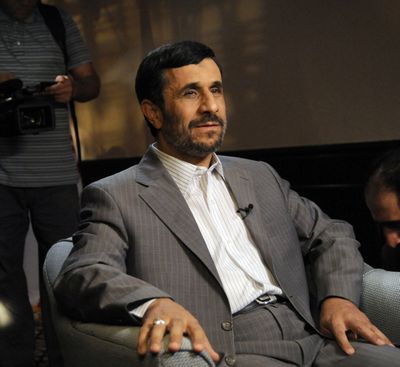Ahmadinejad incites strife among Iranian factions
Agenda angers rivals, alienates middle class

BEIRUT, Lebanon – In New York, Iranian President Mahmoud Ahmadinejad can boast that he’s the talk of the town, appearing on television shows with the likes of Christiane Amanpour and Larry King, hobnobbing with fellow heads of state, and addressing the U.N. General Assembly today.
In Tehran, these days, the outspoken hard-line politician is under withering attack from all political directions. His detractors in recent weeks have included assorted fundamentalist clergymen who have accused him of interfering in religious affairs, a judiciary that humiliated him by delaying the release of American hiker Sarah Shourd, the editor of a right-wing newspaper handpicked by Supreme Leader Ayatollah Ali Khamenei, the moderate head of the powerful Assembly of Experts and a member of parliament who condemned him for praising the pre-Islamic Persian king Cyrus, who is an icon of secular Iranian nationalists.
“The president should be aware that he is obligated to promote Islam and not ancient Iran, and if he fails to fulfill his obligation, he will lose the support and trust of the Muslim nation of Iran,” said lawmaker Ali Mottahari, who is loyal to a rival faction.
Strife between Iranian reformists, conservatives, hard-liners and extreme hard-liners has long shaped Iran’s political system. But in recent months, the arguments and infighting have taken on a far sharper tone, with attacks growing more virulent and vocal. At the heart of the matter, analysts say, is Ahmadinejad himself, a divisive figure whose heavily disputed re-election last year triggered Iran’s worst political crisis in decades.
That battle, between the country’s security apparatus and reformist opposition, continues to make waves throughout the country. On Monday night, opposition supporters in Tehran took to their balconies and rooftops for the first time in months, chanting protest slogans as pro-government Basiji militiamen swarmed through neighborhoods blowing whistles.
“Harsh repression has apparently given some extra oxygen to the regime,” said Michel Makinsky, an Iran specialist at the Poitiers School of Business and Management in France. “But the fire is still burning. There is a divorce between society and the regime.”
Instead of attempting to heal wounds caused by the election, Ahmadinejad during the first year of his second term embarked on an ambitious and rambunctious foreign and domestic policy agenda that further alienated the middle class and angered rival conservative factions long suspicious of him and his entourage.
Recently, the editor of Kayhan, a hard-line mouthpiece, accused the president of being under the Svengali-like sway of his chief of staff, Esfandiar Rahim Mashaei.
Analysts say the Internet has played a major role in sharpening tensions within Iran. Just as cable television has changed the nature of U.S. political discourse, the Internet has sped up the Iranian news cycle. Iranian politicians have taken to the Web with glee, poking each other constantly via connected news agencies and blogs.
“Conservatives are in deep division on major topics,” said Makinsky. “The nuclear crisis is a good example. While Ahmadinejad would be open to contemplate an agreement (with the West) he is unable to sell it to the supreme leader and to some ultra-conservative Revolutionary Guard who consider any deal with the West as a threat against their power.”
Recently, Minister of Intelligence Haydar Moslehi acknowledged that seemingly intractable disputes between powerful officials remain Iran’s weakest point. But there seems to be no way of stopping the escalating rhetoric. Khamenei, 71, with apparent health problems, who has tried to halt the squabbling factions from public disagreements, will eventually pass away.
Few expect Iran to moderate its domestic or international policies as a result of the infighting, which is expected to grow until Ahmadinejad’s term ends in 2013 (although he can run again in 2017) and may get worse afterward especially if Khameni passes away and the military attempts to further impose its will.